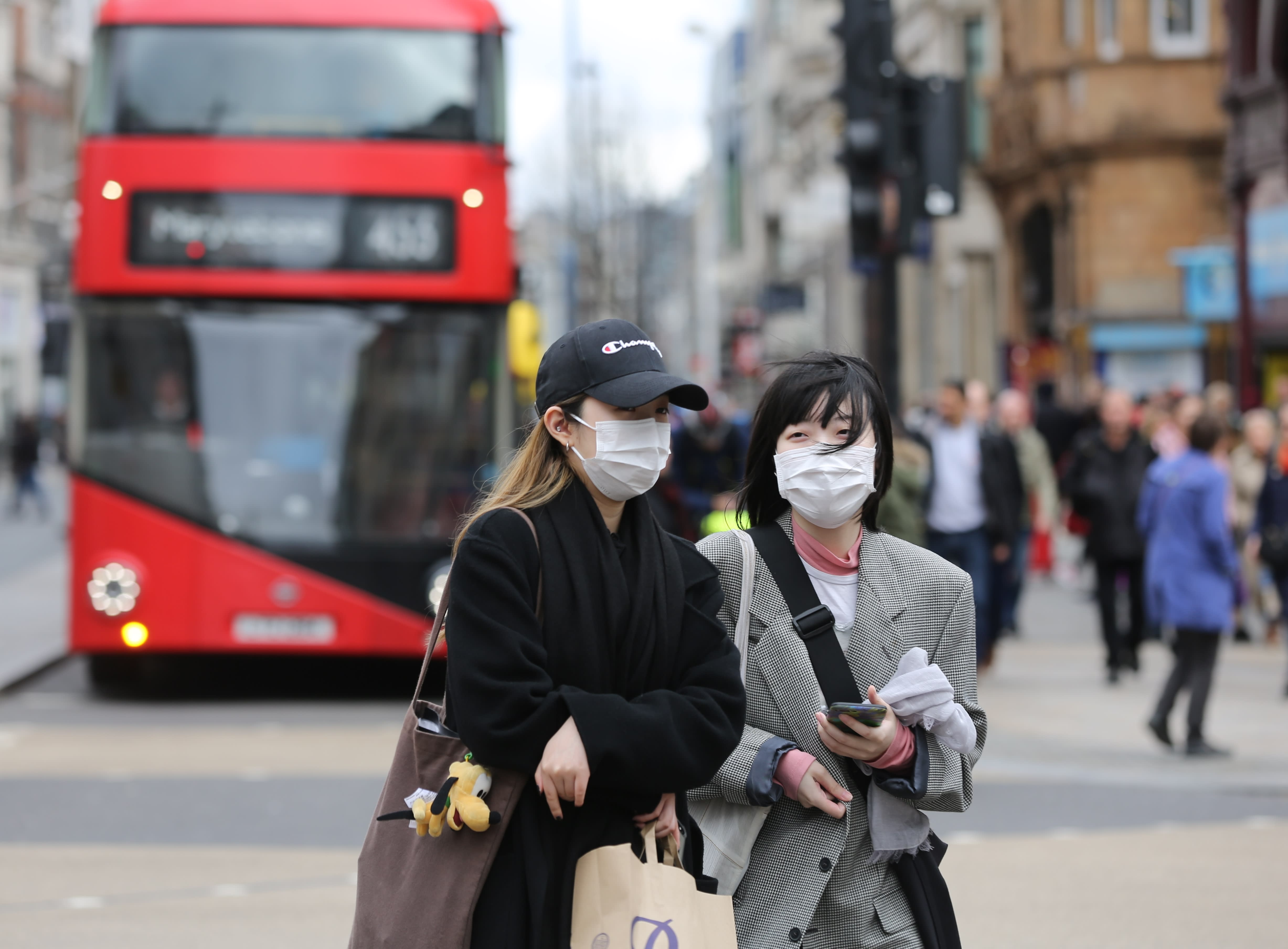
People wear medical masks as a precaution against coronavirus in central London.
Tayfun Salci l Anadolu Agency l Getty Images
U.K. officials are considering an exit strategy to the coronavirus lockdown that would allow young people to be the first to resume their ordinary lives.
Neil Ferguson, a professor at Imperial College London and scientific advisor to the British government, told BBC Radio 4 on Friday that the U.K.'s exit strategy would likely "be targeted by age (or) geography."
Lawmakers are reportedly considering a proposal laid out in a research paper published Monday by scientists at Warwick Business School, that suggested "releasing" citizens aged between 20 to 30-years-old early if they do not live with their parents.
Researchers calculated that approximately 4.2 million people in the U.K. fell into that category.
"Of those, 2.6 million work in the private sector, so unless some corrective action is taken they are likely to be extremely harshly affected financially when compared to employees in the public sector," the authors of the report warned.
While the researchers acknowledged that lockdown measures were necessary to control the public health crisis, they noted that "some balance will eventually have to be struck between epidemiological and economic objectives."
If the "young cohort" — who were less susceptible to becoming critically ill from COVID-19 than older adults — could earn half of their median earnings through an early lockdown release, the paper estimated £13 billion ($16.2 billion) of income could be recovered within a year.
Health officials warned at the end of March that the U.K. could be under some form of lockdown for up to six months.
To date, there have been 65,872 confirmed cases of the coronavirus and 7,993 deaths in the U.K., according to data compiled by Johns Hopkins University.
There was potential for the policy proposed in the Warwick Business School report to be expanded depending on how the situation evolved, researchers said, noting that it could also be implemented in other countries.
"If a so-called antibody test is developed in the meantime, our proposal might be combined with a staged release of older people who have successfully recovered," the report said, adding that "policymakers can, if necessary, expand the argument to include other age bands."
However, the scientists behind the strategy noted that there were some drawbacks to their proposal.
Citing an earlier study from Imperial College London which estimated the fatality rate for those aged 20 to 29-years-old at 0.03%, the Warwick Business School report estimated that if the policy was to be implemented, it could lead to 630 premature deaths from the coronavirus.
"There would be tragic cases — in the current situation there is no riskless way forward," the authors said. "But the proposed policy's effects would be far, far smaller than those from any general release of the population."
They argued that unless a vaccine is discovered quickly, "it is unlikely that there will be any riskless or painless course of action."
Convincing the public
Speaking to CNBC via telephone, Nick Powdthavee, professor of behavioural science at Warwick Business School and one of the paper's authors, said although the proposal was being taken seriously by policymakers, it could be "very, very hard to convince the general public" to accept the strategy.
However, he said it was important to consider that continuing the shutdown for several more months could lead to fatalities that were not caused by the virus itself.
"The cost the number of potential casualties will be far, far worse than thinking sensibly about what would happen if we tried to minimize the risk, not just the risk from coronavirus deaths but those from other things we might not be thinking about."
A prolonged lockdown would eventually lead to more than economic losses, the report said, warning that it would likely result in physical and mental illness, deaths, and extreme levels of debt that future generations would have to repay.
British Prime Minister Boris Johnson announced nationwide lockdown measures in late March, urging citizens to only leave their homes for exercise, medical purposes, to buy basic necessities or to go to work if necessary. However, the government faced criticism early on in the country's outbreak for being too cautious in its approach to controlling the spread of the virus.
Schools in the U.K. are currently closed to all children except those of key workers, as the government attempts to stop the spread of COVID-19. However, a report from University College London earlier this week suggested school closures had little impact on reducing the transmission of the virus.
https://news.google.com/__i/rss/rd/articles/CBMiYmh0dHBzOi8vd3d3LmNuYmMuY29tLzIwMjAvMDQvMTAvY29yb25hdmlydXMtdWstY291bGQtcmVsZWFzZS15b3VuZy1hZHVsdHMtZnJvbS1sb2NrZG93bi1maXJzdC5odG1s0gFmaHR0cHM6Ly93d3cuY25iYy5jb20vYW1wLzIwMjAvMDQvMTAvY29yb25hdmlydXMtdWstY291bGQtcmVsZWFzZS15b3VuZy1hZHVsdHMtZnJvbS1sb2NrZG93bi1maXJzdC5odG1s?oc=5
2020-04-10 11:54:14Z
CAIiEJH_2ZRUI3ivLlwaXohriXUqGQgEKhAIACoHCAow2Nb3CjDivdcCMJ_5ngY
Tidak ada komentar:
Posting Komentar